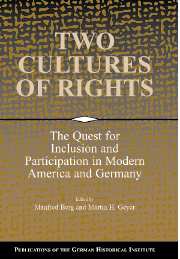Book contents
- Frontmatter
- Introduction
- Part 1 Race, Immigration, and Rights
- 1 Asian Americans: Rights Denied and Attained
- 2 Individual Right and Collective Interests: The NAACP and the American Voting Rights Discourse
- 3 Securing Rights by Action, Securing Rights by Default: American Jews in Historical Perspective
- 4 From Civil Rights to Civic Death: Dismantling Rights in Nazi Germany
- 5 The Rights of Aliens in Germany and the United States
- Part Two Civil and Social Rights
- Part Three Gender, Sex, and Rights
- Index
5 - The Rights of Aliens in Germany and the United States
Published online by Cambridge University Press: 05 January 2013
- Frontmatter
- Introduction
- Part 1 Race, Immigration, and Rights
- 1 Asian Americans: Rights Denied and Attained
- 2 Individual Right and Collective Interests: The NAACP and the American Voting Rights Discourse
- 3 Securing Rights by Action, Securing Rights by Default: American Jews in Historical Perspective
- 4 From Civil Rights to Civic Death: Dismantling Rights in Nazi Germany
- 5 The Rights of Aliens in Germany and the United States
- Part Two Civil and Social Rights
- Part Three Gender, Sex, and Rights
- Index
Summary
Every modern state divides the people of the world into those who belong to it and those who do not, between “citizens” and “aliens.” This reflects the fact that modern states are not only territorial organizations, characterized by the monopoly of violence within a given space, but also membership associations, characterized by space-transcendent reciprocal rights and duties. In an earlier phase of modern state development, mere domicile was sufficient for membership. Beginning with Austria and France in the early nineteenth century, states introduced the more demanding criteria of place of birth and descent to distinguish between those who belonged and those who did not. The increased mobility of individuals and increased functions of the state in society (most important, poor relief) conditioned this change from domicile to birth as the criterion for membership. Once the association with a state was democratically and emotively revalued as membership in a nation, there was not only the “top-down” interest of the state but also the “bottom-up” interest of the nation to sharply demarcate citizens from aliens.
Aliens are subject to sovereign state actions that citizens are not: Aliens may be denied entry to the state, or they may be expelled. According to international law, citizens enjoy the right of entry and residence in “their” state; in addition, they cannot be involuntarily stripped of their citizenship. The rights of entry and residence are precious commodities in a world where only some states provide its members with the rule of law, democracy, and welfare.
- Type
- Chapter
- Information
- Two Cultures of RightsThe Quest for Inclusion and Participation in Modern America and Germany, pp. 95 - 118Publisher: Cambridge University PressPrint publication year: 2002

